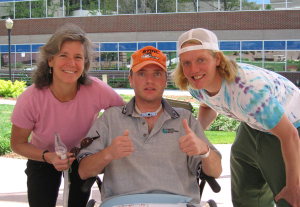Couples/ Marriage Counseling

Do you often wonder…
– Can I even do this relationship thing?
– What does a good relationship even feel like?
– Would we both be better off apart?
Perhaps you feel…
– Angry at the one you love;
– More alone in your relationship than you do when you are by yourself.
– Hopelessly misunderstood by your partner;
– Afraid there is just something wrong with you (or them);
– Crushed by betrayal;
– You are fighting for your life; or,
– Scared you don’t know what to do to make it better.
You are not alone. I have learned in my 34 years of marriage is that the path to a good relationship is often counter intuitive, not something we can easily do without help.
A primary focus of my practice is working with couples, often marriage counseling. The methodology I use is grounded in relatively new research about the nature of adult love. Adult love is a bond. Our brains are wired with a drive to attach. Adults, in every culture, seek secure reciprocal bonds with another.
Disconnection and conflict arise between a couple when, for a myriad of reasons, that bond is not perceived as safe. In Emotionally Focused Therapy for Couples (EFT) we work to discover the deep emotions that trigger conflict or disconnection and the cycles of behaviors, thoughts and reactions that follow. Usually we discover a cycle, a negative loop, that becomes the dominate dance of disconnection. That cycle hijacks the couple’s ability to stay connected, get what we need and dwell in the place of safety and secure connection.
In the words of Dr. Susan Johnson, who developed this model, “We help you really understand your needs in this relationship and help you respond to each other’s needs – and we help you learn about the moments when you hurt each other in your dance and how you can keep your emotional balance in those moments. Then we can show you how to come close and express your softer feelings and needs in a way that helps your partner respond to you – so you can build a secure lasting bond.”
The results of extensive research over 30 years find that approximately 90% of couples show significant improvements with Emotionally Focused Therapy. Research has also found no correlation between outcome success and level of distress when beginning therapy.
The task of EFT is to facilitate the development of a secure, safe bond. I make every effort to have therapy be a safe place, a place safe enough to explore and express your emotions and needs.
For more information about Emotionally Focused Therapy (EFT) see:
Individuals

I have experience and appreciate working with individuals of all ages. Many issues bring people to therapy. Some of the most common include:
– Anxiety
– Depression
– Relationship and family issues
– Trauma, past or recent
– Addiction
– School or work issues
– Pain or illness
– Mood disorders
– Mental illness
– Life patterns that aren’t working
Therapy with me begins from a place of curiosity. Through conversation in a safe, nonjudgmental environment, we explore what brought you here and where you would like to go. Dialog about your life experience and deeper emotions helps us gain insight and direction.
The theoretical underpinnings of my work as a therapist are interpersonal neurobiology and attachment theory.
Interpersonal neurobiology is a term used to describe the way the brain grows and changes, particularly how the brain is changed by personal relationships. Often times, we forget the way our physical brain operates has anything to do with our “problems.”
Attachment theory describes the dynamics of human bonding including our initial bonding experiences as children and our adult relationships. The drive to attach is a human imperative which provides a lens to understand much of human behavior in many contexts as normal and also a roadmap to facilitate deep and permanent change.
Throughout the course of therapy, our work is collaborative. I strive to be transparent: listening, asking for clarification, explaining why I am doing what I am doing. We might develop short, at-home practices. I may provide referrals for additional supports. I always want to know what is and is not working for you.
Photo credit: Laurie Werner
Children, Adolescents and Families

I have years of experience working with children, adolescents and families in schools, treatment facilities and as a psychotherapist in private practice. As much as possible, I do my work with children AND their parents or primary supporting adult. As a social worker, I believe that environment affects who we are, so I willingly collaborate with school, court or any other organizations that impact the life of the child or adolescent.
One of the many reasons I love working with children and adolescents is that making a positive change at this developmental stage provides a foundation for future development. I find kids of all ages to be curious, insightful and, like all of us humans; have a powerful, fundamental drive toward health.
Adolescence is an exciting and tricky developmental phase. It is a time when young people usually begin making independent life choices and shift their focus from family to peers. Our view of the world changes during adolescence because of neurological development.
Working with adolescents has been my passion since I was an adolescent many years ago. I continue to feel honored when a teenager really opens up to this grey haired lady and can believe that I am a supportive person, someone in their corner.
Actually, a few of my past adolescent clients have written to me about their experience working with me.
The particular model of family therapy that most informs my work with families is based on attachment theory. It is called Emotionally Focused Family Therapy (EFFT). In this model, we explore emotional needs and bonds, and work experientially to make these bonds more safe and secure.
Photo credit: Laurie Werner
Traumatic Brain Injury (TBI) Survivors and Their Families

“Brain injury affects the whole person, including changes in the physical, emotional, and cognitive areas of the body. These changes can impact how a person reacts to his or her daily life, including school and work, and how s/he manages his or her finances. Relationships and a person’s wellbeing are determined by how well he or she can manage these challenges. The road can seem long and insurmountable, especially without help.” Brain Injury Alliance of Colorado
My interest in the brain began in the 1970s when I was student and was intensified when our son suffered a severe TBI in 2006. I would often say, on better days, “If this was not personal it would be one of the most interesting experiences of my life.” Brain injury does affect the whole person. In many ways my son is a different person now than he was before his accident. He is a wonderful person and I know that the enormous amount of help and support he and our whole family got during his long recovery made a difference.
TBI, ranging from mild to severe, looks different in each person. Some people don’t even know they have suffered a brain injury until their lives seem like they are falling apart.
Some areas of support I provide for TBI survivors and their families are:
– tools to manage stress,
– therapy for emotional issues,
– space to process grief and loss,
– help with relationship issues and
– guidance to help the mind heal the brain.
New understanding of neural plasticity, the amazing ability of the brain to recover, rewire and heal, makes this a hopeful time for those recovering from TBI. Recovery is slow but sure and it takes work. Support can make all the difference.
Brain Injury Alliance of Colorado
To hear more about my son’s story, email me: wgaylord@gmail.com